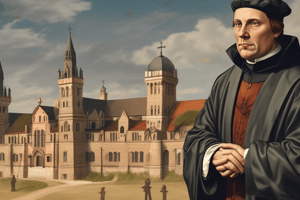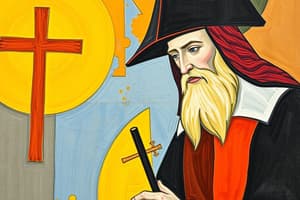Podcast
Questions and Answers
What aspect of Lutheranism did the urban centers of Germany particularly embrace?
What aspect of Lutheranism did the urban centers of Germany particularly embrace?
- Rejection of clergy involvement in governance
- Strict adherence to Catholic traditions
- Centralized political authority
- Individual relationship with God (correct)
What was a notable demand of the peasants during the Peasants' Revolt of 1524-25?
What was a notable demand of the peasants during the Peasants' Revolt of 1524-25?
- Outlawing hunting and pasture rights
- Increase in church taxes
- Abolition of tithe (correct)
- Restoration of serfdom
Which group was primarily responsible for carrying out religious reforms in Germany?
Which group was primarily responsible for carrying out religious reforms in Germany?
- Only the educated elite
- Nobility only
- Clergy from a wider range of social classes (correct)
- Higher clergy and archbishops
What was Luther’s response to the Peasants' Revolt?
What was Luther’s response to the Peasants' Revolt?
What was one reason why the Reformation thrived in German towns?
What was one reason why the Reformation thrived in German towns?
The Augsburg Confession is best described as:
The Augsburg Confession is best described as:
What common theme linked the spread of the Reformation to social issues?
What common theme linked the spread of the Reformation to social issues?
How did humanists react to Luther's movement differently than Luther himself?
How did humanists react to Luther's movement differently than Luther himself?
Flashcards
How did the HRE's political structure aid the Reformation?
How did the HRE's political structure aid the Reformation?
The decentralized political structure of the Holy Roman Empire (HRE) allowed for individual towns to have independent rule. This helped the Reformation flourish because each town's elite burghers were open to Luther's ideas and were disillusioned with the established clergy.
How did the common experience of German townspeople influence the Reformation?
How did the common experience of German townspeople influence the Reformation?
The Reformation's spread in German towns was influenced by the common experience of people in the material world, which translated into a belief in communal salvation. Luther's emphasis on individual relationship with God, which could lead to improved citizenship, further resonated with the townspeople.
Why were the burghers of German towns open to the Reformation?
Why were the burghers of German towns open to the Reformation?
The spread of the Reformation in German towns was encouraged by the burghers, who were the elite merchants and artisans, who had long been frustrated with the incompetence and unfaithfulness of the clergy. They welcomed the Reformation's emphasis on a direct relationship with God and a simpler form of worship.
What was the impact of the Imperial Diet's decision in 1524?
What was the impact of the Imperial Diet's decision in 1524?
Signup and view all the flashcards
How did the Reformation's clergy contribute to its spread?
How did the Reformation's clergy contribute to its spread?
Signup and view all the flashcards
What were the demands of the Peasants' Revolt and Luther's response?
What were the demands of the Peasants' Revolt and Luther's response?
Signup and view all the flashcards
What were some of the key institutional developments during the Reformation?
What were some of the key institutional developments during the Reformation?
Signup and view all the flashcards
Why did humanists eventually distance themselves from Luther?
Why did humanists eventually distance themselves from Luther?
Signup and view all the flashcards
Study Notes
Social Background of the Reformation in German States
- Urban centers played a crucial role in the Reformation, as they fostered a tradition of popular participation in religious matters.
- German towns had influential burghers who readily embraced Luther's ideas primarily due to their frustration with incompetent and unfaithful clergy.
- Common experiences and shared material values among townspeople translated into communal salvation.
- Luther's emphasis on the individual relationship with God facilitated better citizenship.
- Southern German states remained largely Catholic.
The Process of Reform
- Reform clergy, often drawn from lower classes, spread Luther's ideas.
- Some clergy abandoned their positions and joined the movement, including former priests and nuns, who often married.
- Luther and Katharina von Bora's marriage symbolized this shift.
- Luther urged people to participate actively in worship, including singing hymns and reading local translations of the Bible.
The Peasants' Revolt
- The period from 1524-1525 saw peasant uprisings in central and southern German states.
- Peasants challenged increasing taxes and demanded rights like hunting freely, pasturing animals, and abolition of tithes and serfdom.
- They sought to simplify church practices and end double taxation.
- Luther initially supported some of these demands but ultimately denounced the violence of the revolt.
- Thousands of peasants were killed, and the revolt was swiftly suppressed.
The Spread of the Reformation
- The Reformation's spread was intertwined with political and economic divisions.
- A desire for social, as well as spiritual equality emerged.
- The Augsburg Confession outlined key tenets of the Protestant faith.
- Some humanists supported Luther's movement, appreciating his use of the original Hebrew and Greek versions of the Bible, but others remained loyal to the Catholic Church.
- Scholars challenged religious dogma through humanist analysis of knowledge as an end in itself.
Studying That Suits You
Use AI to generate personalized quizzes and flashcards to suit your learning preferences.




